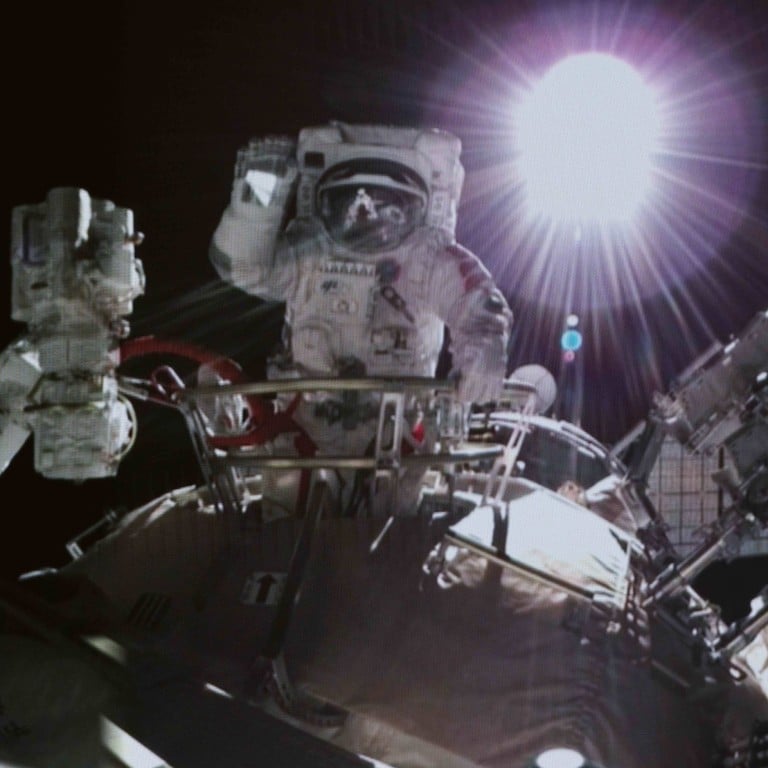
Busy May looms for China space launches as Tiangong trio prepare for home
- The record-setting astronauts have conducted dozens of scientific experiments and several spacewalks during their 180-day mission on board the space station
- China’s space agency is planning three more launches next month, with another crew set to leave Earth for the partly-built station in mid-May
Chinese state media has reported that ground crews at the Dongfeng landing site in northern China’s Inner Mongolia region have been rehearsing the search and retrieve exercise for the astronauts as they wind up their almost six-month mission.
But Tiangong will not be left vacant for long. According to an informed source, who asked not to be named, a cargo vessel will launch just weeks after the astronauts’ return, taking supplies to the station ahead of the arrival of the next crew.
“In around mid-May, we will have the Shenzhou 14 manned mission, sending three new astronauts to the space station for another 180-day mission from the Jiuquan launch centre [also in Inner Mongolia],” the source said.
The departure of the next crewed mission will be followed by the launch of the Wentian laboratory capsule, the next stage in Tiangong’s construction. It is expected to leave between late May and early June from the Wenchang launch site in the southern island province of Hainan.
Three further launches are planned for the second half of the year – the Mengtian space lab, the Tianzhou 5 cargo flight to deliver supplies, and a third crewed mission, Shenzhou 15.
Chief designer of China’s astronaut project Zhou Jianping said last month the crews of Shenzhou 14 and Shenzhou 15 would spend a week together on board the space station during their rotation at the end of the year.
He told Chinese state media the crossover would set a record for China, with six astronauts in orbit at the same time.
The latest mission, which began in October, has included dozens of scientific experiments and two spacewalks. The astronauts have installed parts on the station’s exterior, used a robotic arm to move a cargo spaceship, and live-streamed their experiences to millions in China.
Quentin Parker, head of the Laboratory for Space Research at the University of Hong Kong, said China was in a unique position to promote international space cooperation, with the imminent retirement of the International Space Station (ISS) and dispute over Russia’s participation.
“They should actually make more announcements about [the Tiangong station] and reiterate that China’s space station welcomes astronauts from elsewhere,” he said.
Beijing has previously said Tiangong will be a platform for international cooperation, with the first batch of nine projects from 17 countries selected for on board experiments, as well as its collaboration with the UN Office for Outer Space Affairs.
But collaboration between China and the US halted in 2011 after Congress passed a law prohibiting Nasa from working with its Chinese counterpart. Nevertheless, Nasa has helped the China National Space Administration (CNSA) with some missions.
From ISS rival to sea rocket launcher: 4 Chinese space targets for 2022
Specific congressional approval was given for Nasa to work with China in 2019, using its lunar reconnaissance orbiter to help the CNSA monitor the Chang’e 4 moon landing and the Yutu 2 rover’s exploration of the far side of the moon.
Parker said a reaffirmation from Beijing on international cooperation would encourage the world’s space communities to submit better experiments and send their best crews to work with their Chinese counterparts on Tiangong.
“The geopolitics of the space station have also changed significantly over the past 18 months and even more now with the terrible situation in Ukraine,” he said.
Parker said the war in Ukraine was likely to have “a big impact” on the ISS, which relies heavily on international cooperation, with Russia regularly ferrying supplies and astronauts to the station, along with its financial contribution to the programme.
‘Nobody benefits from barriers’: call for more collaboration in space
Last Saturday, the head of Russia’s space agency threatened to end its cooperation, blaming the wide-ranging sanctions imposed by the West over the Ukraine invasion.
Roscosmos director general Dimitry Rogozin said restoration of normal relations between the ISS partners and other joint projects would only be possible “with the complete and unconditional lifting of illegal sanctions”.
Under the present agreement, the coalition of 16 countries behind the ISS is set to run through 2024. Nasa is pushing to extend the agreement to 2030.
Parker said the continuity of the ISS programme was becoming an issue and “I suspect America and the West would not cooperate, given what is going on [in Ukraine] anyway”.
“China has a good opportunity here,” he said.

